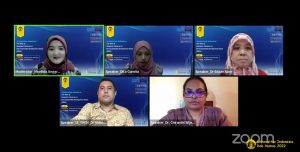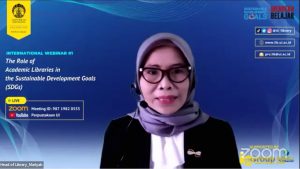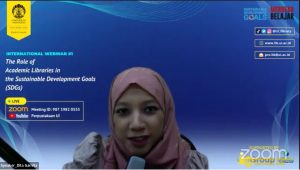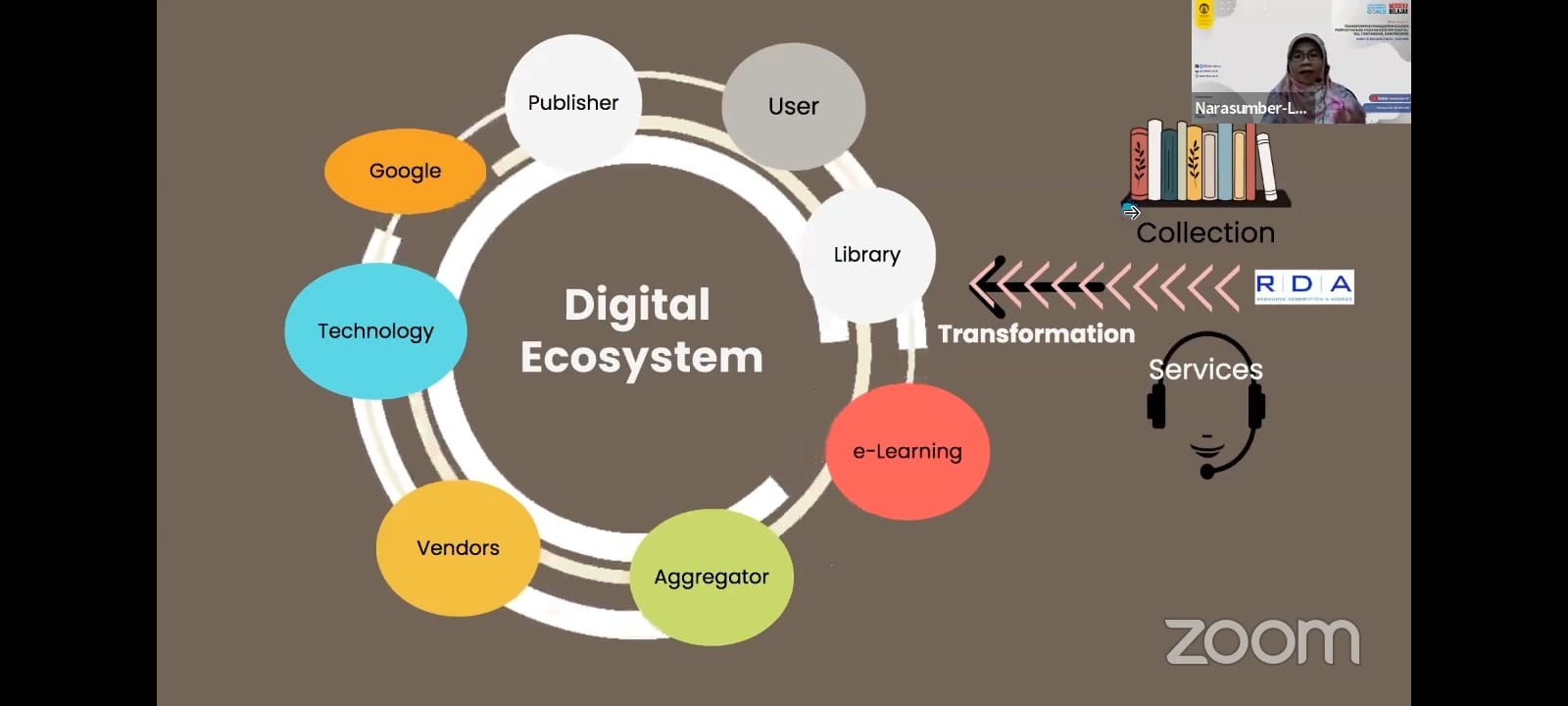
The Sustainable Development Goals (SDGs) are an agenda drawn up by the United Nations (UN) in 2015. The agenda that guides the global development plan consists of 17 goals and 169 targets to be achieved by 2030. The University of Indonesia (UI) has direct involvement in the development of the central government’s SDG policies including identifying problems and challenges, developing policies and strategies, and modelling. UI’s commitment to implementing the SDGs is recognized by international university rating agencies, such as Times Higher Education (THE) and UI GreenMetric. In fact, UI has succeeded in increasing its ranking from 85 in 2021 to 18 in the version of THE Impact Rankings in 2022. ]This increase cannot be separated from the library’s role as a provider of literature and publication media.

According to the Vice Chancellor for Academic and Student Affairs at UI, Prof. Dr. rer. nat. Abdul Haris, higher education is an important sector that has a big impact on the SDGs program. As one of the best universities in Indonesia, UI seeks to develop itself to achieve the SDGs,one of which is through improving library services. “This activity is UI’s commitment to the SDGs which is expected to open up insights and be a source of opportunity for all stakeholders as well as an inspiration for librarians and information providers in Indonesia,,” said Prof. Haris in the webinar “The Role of Academic Libraries in the Sustainable Development Goals” held by the UI Library, on Wednesday (22/06).
To achieve the SDGs, the main role of universities is to improve the beauty of the university environment, combine the skills of staff and students, and apply knowledge in real. The UI library supports these efforts by promoting information literacy, providing access to information, advancing digital inclusion, preserving and providing access to culture and world heritage, and functioning as a research center.

said that the target of this international webinar is the implementation of activities in the library to achieve SGDs. “Participants in this webinar are students, librarians, managers in ASEAN, operational managers, lecturers, and the general public. The seminar is free and participants will receive an electronic certificate. I hope this webinar can run smoothly and be useful for all,” said Mariyah in her speech.
According to the UI librarian, Dita Garnita, S.K.M., the UI library provides assistance to the community by supporting sustainable start-ups, both financially and socially, through mentoring programs, training workshops, and access to university facilities. “We have a policy that ensures that access to this activity can be obtained by everyone, regardless of ethnicity, religion, physical condition, immigration status, or gender,” Dita added.

In achieving the SDGs, the UI Library ensures inclusive and equitable quality education through the provision of easily accessible facilities. Currently, 70% of the Ul Library collection is available in digital format and can be accessed through the UI Library (lib.ui.ac.id) and Remote Access (remote-lib.ui.ac.id). During the pandemic, the Ul Library continues to hold virtual information literacy training for lecturers, students, librarians, and the general public to increase the knowledge and skills of academics.
“UI library also supports the SDGs goals in renewing and planning sustainable cities and people. The UI Library building has a sustainable and environmentally friendly concept because it uses natural lighting. This practice reduces energy consumption and supports energy efficiency. Even so, this is a challenge for the UI Library to provide facilities that can be accessed at any time by anyone and prioritize space and energy efficiency,” said Head of the Transformation, Risk Management, and Evaluation Monitoring Bureau, Vishnu Juwono, S.E., M.I.A., Ph. D.
Regarding the role of libraries in helping universities to achieve the SDGs, universities in Malaysia also apply this. Head of the Malaysian Librarians Association, Dr. Nor Edzan Bt. Che Natsir, conveyed that the United Nations stated to The International Federation of Library Associations and Institutions (IFLA)—the international body that oversees library services —that libraries have a role in several SDGs goals, including improving the quality of education in the 4th goal; peace, justice and strong institutions in the 16th goal; and partnerships to achieve the 17th goal. With this, libraries can encourage the achievement of the UN 2030 agenda.
According to Dr. Nor, the role that libraries can play in achieving the SDGs is to communicate, advocate, and inform the SDGs to universities through libraries; identify academics involved in projects related to the SDGs and assist them; and ensuring the availability of infrastructure for the academic and research community around the world.
“Libraries can map activities related to the SDGs and ensure that there is collective reporting related to the SDGs. Libraries must also ensure that activities related to SDGs are included in the Library Map of the World by IFLA. Being active in the SDGs means giving librarians the visibility that libraries are doing something regionally, nationally, and even internationally,” said Dr. Nor ends his presentation
The academic library is an essential and crucial component in the teaching and learning process. Libraries play a role in increasing knowledge and infrastructure as well as holding programs that reach the community. Libraries also play a role in introducing innovative technology, developing the concept of a “smart library”, as well as improving and encouraging the research process. The provision of facilities for teaching and learning activities, the establishment of interactive discussions, involvement in community activities, as well as communication related to the SDGs are also the roles of academic libraries.
“Academic libraries in various regions have implicitly adopted the SDGs with different quality and quantity. However, libraries should have a clear plan regarding the SDGs goals to be achieved from their activities. Academic libraries need to investigate their institutional strategic plans to identify objectives. Achieving the SDGs is not practical because the socio-economic situation in different countries is different. However, we can start from scratch and develop further,” said Senior Assistant Librarian at the Main Library, University of Colombo, Sri Lanka, Dr. Chiranthi Wijesundara.
For more information refer to:

